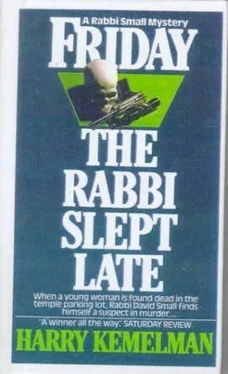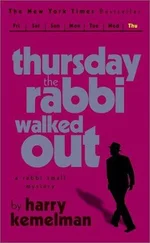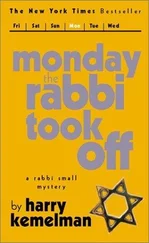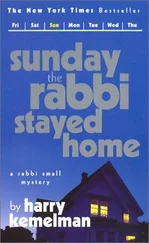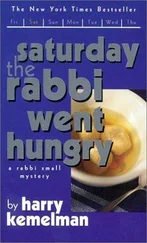Harry Kemelman - Friday The Rabbi Slept Late
Здесь есть возможность читать онлайн «Harry Kemelman - Friday The Rabbi Slept Late» весь текст электронной книги совершенно бесплатно (целиком полную версию без сокращений). В некоторых случаях можно слушать аудио, скачать через торрент в формате fb2 и присутствует краткое содержание. Жанр: Детектив, на английском языке. Описание произведения, (предисловие) а так же отзывы посетителей доступны на портале библиотеки ЛибКат.
- Название:Friday The Rabbi Slept Late
- Автор:
- Жанр:
- Год:неизвестен
- ISBN:нет данных
- Рейтинг книги:5 / 5. Голосов: 1
-
Избранное:Добавить в избранное
- Отзывы:
-
Ваша оценка:
- 100
- 1
- 2
- 3
- 4
- 5
Friday The Rabbi Slept Late: краткое содержание, описание и аннотация
Предлагаем к чтению аннотацию, описание, краткое содержание или предисловие (зависит от того, что написал сам автор книги «Friday The Rabbi Slept Late»). Если вы не нашли необходимую информацию о книге — напишите в комментариях, мы постараемся отыскать её.
Friday The Rabbi Slept Late — читать онлайн бесплатно полную книгу (весь текст) целиком
Ниже представлен текст книги, разбитый по страницам. Система сохранения места последней прочитанной страницы, позволяет с удобством читать онлайн бесплатно книгу «Friday The Rabbi Slept Late», без необходимости каждый раз заново искать на чём Вы остановились. Поставьте закладку, и сможете в любой момент перейти на страницу, на которой закончили чтение.
Интервал:
Закладка:
6
At half-past seven Jacob Wasserman rang the bell of the rabbi's house. Mrs. Small answered the door. She was tiny and vivacious, with a mass of blonde hair that seemed to overbalance her. She had wide blue eyes and an open frank face that would have seemed ingenuous were they not offset by a firm, determined little chin.
"Come in, Mr. Wasserman, come in. It's so nice to see you."
Hearing the name, the rabbi, who had been engrossed in a book, came into the hall. "Why, Mr. Wasserman. We have just finished supper, but you'll have some tea, won't you? Make some tea, dear."
He led his visitor into the living room, while his wife went to set the water on. The rabbi placed the book he was holding face-down on the table beside him and looked inquiringly at the older man.
Wasserman suddenly realized that the rabbi's gaze, though mild and benign, was also penetrating. He essayed a smile. "You know, rabbi, when you first came to our congregation you suggested that you ought to sit in on the meetings of the board. I was all in favor of it. After all, if you engage a rabbi to help direct the development of a congregation, what's better than to have him sitting in on the meetings where the various activities are planned and discussed? But they voted me down. And do you know what their reason was? They said the rabbi is an employee of the congregation. Suppose we want to talk about his salary or his contract? How can we, if he's sitting right there with us? So what was the result? All year the matter wasn't even mentioned-until this last meeting. Then I suggested that we ought to decide about the contract for next year since there are only a couple of meetings left before we adjourn for the summer."
Mrs. Small came in with a tray. After serving them, she took a cup for herself and sat down.
"And what was decided about the contract?" asked the rabbi.
"We didn't decide anything," said Wasserman. "It was held over for the next meeting-that is, for this coming Sunday."
The rabbi studied his teacup, his brow furrowed in concentration. Then without looking up, as if thinking aloud, he said, "Tonight is Thursday, three days before the meeting.? approval were certain and the vote only a matter of form, you would have waited until Sunday to tell me.? approval were likely but not absolutely certain, you would probably mention it when next you happened to see me, which would be Friday evening at the services. But if it looked as though the vote were uncertain or even likely to go against me, you would not want to mention it Friday evening for fear of spoiling my Sabbath. So your coming tonight can only mean that you have reason to believe I will not be reappointed. That's it, isn't it?"
Wasserman shook his head in admiration. Then he turned to the rabbi's wife and waggled an admonishing forefinger. "Don't ever try to deceive your husband, Mrs. Small. He'll find you out in a minute." He turned back to the rabbi. "No, rabbi, that's not it, at least not exactly. Let me explain. We have forty-five members on the board of directors. Think of it! It's more than they have on the board of General Electric or United States Steel. But you know how it is, you put on the board anyone who is a little of a somebody; anyone who does a little work for the temple, or you think maybe he'll do some work for the temple, you put him on the board. It's an honor. Without meaning to, you usually end up with a board made up of the richer members of the congregation. Other temples and synagogues do the same thing. So of the forty-five, maybe fifteen come to every meeting. Then maybe ten more come every now and then. The rest, you don't see them from one year to the next. If only the fifteen regulars were to show up, we would win by a large majority, maybe as much as four to one. To most of us, it was merely a matter of form. We would have voted the contract right then and there. But we couldn't fight the motion to hold it over for a week. It seemed reasonable and it's what we do in all important decisions. But the opposition, Al Becker and his group, evidently had something else in mind. He doesn't like you, Al Becker. Just yesterday I found out that they went to work and phoned the thirty or so who don't come regular. And from what I can see, they didn't just argue the question with them. They put on whatever pressure they could. When I heard about it yesterday from Ben Schwarz, I began to contact these people myself, but I was too late, I found that most of them were already committed to Becker and his friends. That's how matters stand now. If we have the usual meeting with the usual members present, we'll have no trouble winning. But if he gets the whole board to attend…"He spread his hands, palms up, in token of defeat.
"I can't say that this comes as a complete surprise to me," the rabbi said ruefully. "My roots are in traditional Judaism, and when I entered the rabbinate, it was to become a rabbi of the sort my father was and my grandfather before him, to live the life of a scholar, not in seclusion, not in an ivory tower, but as part of the Jewish community, and somehow to influence it. But I'm beginning to think that there is no place for me or my kind in a modern American Jewish community. Congregations seem to want the rabbi to act as a kind of executive secretary, organizing clubs, making speeches, integrating the temple with the churches. Perhaps it's a good thing, perhaps I'm hopelessly out of fashion, but it's not for me. The tendency seems to be to emphasize our likeness to other denominations, whereas the whole weight of our tradition is to emphasize our differences. We are not merely another sect with minor peculiarities; we are a nation of priests, dedicated to God because He chose us."
Wasserman nodded his head impatiently. "But it takes time, rabbi. These people who make up our congregation grew up during the period between the two World Wars. Most of them never went to a cheder or even a Sunday school. How do you think it was when I first tried to organize a temple? We had fifty Jewish families here at the time, and yet when old Mr. Levy died, just to get a minyan so his family could say Kaddish-it was like pulling teeth. When we first started our temple, I went to see each and every Jewish family in Barnard's Crossing. Some of them had arranged car pools to take their kids to Sunday school in Lynn; some had a teacher come out to give their boys instruction for a few months so they could hold a Bar Mitzvah, and they used to phone back and forth to make arrangements to deliver him to the home of his next pupil. My idea was to establish a Hebrew school first, and use the same building for services for the holidays. Some thought it would cost too much money, and others didn't want their children to feel different by having them go to a special school in the afternoon.
"But little by little, I won them over. I got figures on costs, estimates, prices, plans, and then when we finally acquired a building, it was a wonderful thing. In the evenings, and Sundays, they used to come down-the women in slacks, the men in dungarees, everybody working together, cleaning, fixing, painting. There were no cliques then, no parties. Everybody was interested and everybody worked together. They didn't know very much, these young people. Most of them couldn't even say their prayers in Hebrew, but the spirit was there.
"I remember our first High Holiday services. I borrowed a Scroll from the Lynn synagogue, and I was the leader and the reader, and I even gave a little sermon. For the Day of Atonement, I had a little help from the principal of the Hebrew school, but most of it I did myself. It was quite a day's work, and on an empty stomach, too. I'm not a young man and I know my wife worried, but I never felt better in my life. It was a wonderful spirit we had in those years." "Then what happened?" asked the rabbi's wife. Wasserman smiled wryly. "Then we grew. Jews really began to come to Barnard's Crossing then. I like to think that our having: a school and a temple had something to do with it. When there were only fifty families everybody knew everybody else, differences of opinion could be hammered out in personal discussion. But when you have three hundred or more families, as we have now, it's different. There are separate social groups now who don't even know each other. You take Becker and his group, the Pearlsteins and the Korbs and the Fein-golds, those who live on Grove Point, they keep to themselves. Becker is not a bad man, you understand. In fact, he's a very fine man-and all those I mentioned, they're all fine people, but their point of view is different from yours and mine. From their point of view, the bigger, the more influential, the temple organization is, the better."
Читать дальшеИнтервал:
Закладка:
Похожие книги на «Friday The Rabbi Slept Late»
Представляем Вашему вниманию похожие книги на «Friday The Rabbi Slept Late» списком для выбора. Мы отобрали схожую по названию и смыслу литературу в надежде предоставить читателям больше вариантов отыскать новые, интересные, ещё непрочитанные произведения.
Обсуждение, отзывы о книге «Friday The Rabbi Slept Late» и просто собственные мнения читателей. Оставьте ваши комментарии, напишите, что Вы думаете о произведении, его смысле или главных героях. Укажите что конкретно понравилось, а что нет, и почему Вы так считаете.
